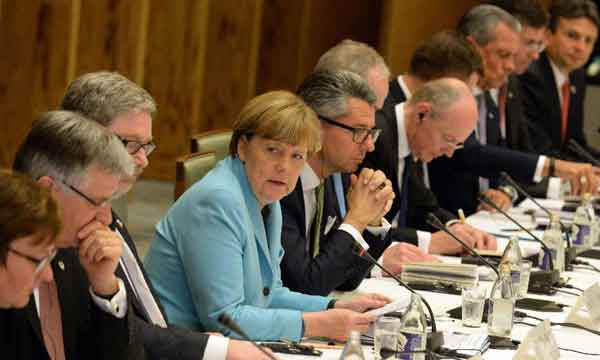

 |
| Germany's Chancellor Angela Merkel (4th L) and Japan's Prime Minister Shinzo Abe (not pictured) take part in a meeting with German and Japanese business leaders in Tokyo, Japan, March 9, 2015. (Xinhua/Ma Ping) |
German Chancellor Angela Merkel visited Japan on March 9 with the aim of making preparations for the G7 summit. Traditionally, the host country will visit members to discuss the schedule. But Merkel also took the initiative to talk with Japan about how her own country had been accepted by European neighbors and the international community after the end of World War II, noting that Japan should face up to its own history squarely.
Merkel is qualified to advise Japanese Prime Minister Shinzo Abe to do so because Germany has been forgiven by the victims of its aggression and won the respect of the international community. German officials can discuss its history calmly.
Merkel's remarks came at a time when Abe has indicated that he will not use the words “aggression” and “colonialism” in his new war anniversary speech. Japan’s neighbors are becoming increasingly dissatisfied by Abe’s attitude towards the country's history, and this may damage Japan’s relations with China and South Korea.
Abe may not accept Merkel’s advice.
Obviously, Abe is reluctant to talk about history. Even before the visit, the German media had already made the point that Abe’s government was worried about the prospect that Merkel might wish to talk about World War II. Abe’s government is sensitive to any criticism of Japan’s attitude to its history of aggression.
Merkel is not the first person to raise the issue with Abe. In fact, there is no shortage of voices in Japan itself demanding that the country look squarely at its history. Some former Japanese officials hold the view that acknowledging the past would strengthen the country's moral standing.
Japan is clearly aware of the position of the international community. Fifty years after Word War II, Japanese former Prime Minister Tomiichi Murayama made a statement to acknowledge that Japan’s expansionism had inflicted terrible suffering on other nations. The statement was welcomed by the international community. The “Murayama Statement” also seemed to demonstrate that Japan planned to make make a clean break with the past and commit itself to peace and international cooperation.
Japan was the aggressor and China and South Korea were the victims. Only when the aggressor honestly reflects on its atrocities, can the victims show forgiveness.
This article was edited and translated from 《默克尔好言相劝,安倍会买账吗》, source: People's Daily Overseas Edition, Author: Su Xiaohui
 Beijing's toughest anti-smoking law takes effect
Beijing's toughest anti-smoking law takes effect Attendants-to-be join Mr. & Miss Campus Contest
Attendants-to-be join Mr. & Miss Campus Contest China hosts overseas disaster relief exercise for the first time
China hosts overseas disaster relief exercise for the first time 20 pairs of twins who will become flight attendants in Sichuan
20 pairs of twins who will become flight attendants in Sichuan J-11 fighters in air exercise
J-11 fighters in air exercise PLA soldiers operating vehicle-mounted guns in drill
PLA soldiers operating vehicle-mounted guns in drill Beauties dancing on the rings
Beauties dancing on the rings Blind carpenter in E China's Jiangxi
Blind carpenter in E China's Jiangxi Top 10 highest-paid sports teams in the world
Top 10 highest-paid sports teams in the world Obama is sowing discontent in S.China Sea
Obama is sowing discontent in S.China Sea Rescuers work through night to reach cruise ship survivors
Rescuers work through night to reach cruise ship survivors Driving through limbo
Driving through limbo Facing down MERS
Facing down MERSDay|Week